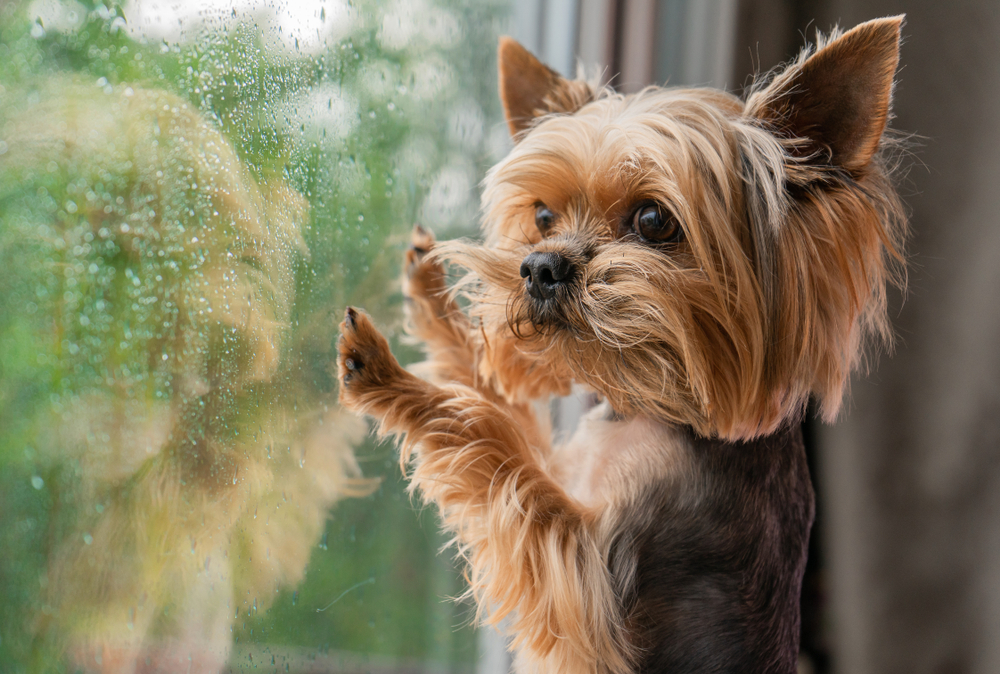£0.00 (0) Cart
With many of us getting ready to go back to work following the Covid 19 lockdown, we must remember to take into account that our pets might need some readjustment time as we suddenly disappear from a home that we have been in 24/7 for the last few months.
It has no doubt seemed like a real treat for our dogs to have our company all day, every day. For us, having our dogs around during these strange times has made us feel normal and connected, especially if we otherwise live alone. But taking away this constant companionship could have an unsettling effect on our furry friends, such as a condition called separation anxiety. We have taken a closer look at how our dogs may react on our return to normality and at what we can do to make the transition as easy as possible for them.

After being so used to having owners around all day, their sudden absence may lead a dog to feel distressed at being left alone. This is often true of rescue dogs who have been re-homed, who may worry when their new owner is out for long periods of time, harbouring a fear that they may never return. The dog may start to act differently, particularly around certain times of the day and may even appear to be depressed. Misbehaviour may increase, which is noticeable if that dog has always been good in the past.
There are a few signs that you should look out for when you start to leave your dog alone for longer periods of time, to see if they are not coping as well as they should.
You may not think that animals can feel sad or depressed, but you will see a definite change in their behaviour and attitude if they are not coping well with your absence. If not addressed as soon as you notice the change it could lead to longer term issues, with their behaviour escalating and possible aggression occurring when you come to leaving them for the day. This aggression could then filter into normal day to day life when you are actually at home.
If you are planning to get a new puppy, then you should get them used to being apart from you whilst they are young, as it is a routine that they will accept easier from the start.
If you suspect that your dog will not react well to you going back to work, try to plan in small absences from the home and build on them gradually. Start with half an hour at a time and then the next day make it an hour. Leave the house at the time of day that you will be expecting to leave for work so they can get used to this. When the day comes and you know you will be leaving them alone for a long period of time, have a routine of taking them out for a walk before you are due to go. This will give them time to go to the toilet and to burn off some energy. You could also try:
It is important not to punish your dog if you suspect that they have separation anxiety. This will only make them feel more anxious when you leave the house and could potentially ruin their normal good behaviour. Dogs are very sociable animals, they love having families to interact with, to go on walks with and to enjoy quality time playing or relaxing in the evenings, so having this change is bound to make them feel worried. Have a little bit of understanding and try some of our tips to make them feel more settled and before long your routine should be back to the way it was before the Coronavirus lockdown.
Although all breeds of dog can suffer from separation anxiety, there are four breeds which are more at risk than others. There is no proven reason for why these particular dogs are more prone, but the thinking is that they are more of a companionship dog or people pleaser, needing closeness to their owner more than most.
Toys can have a very positive effect on dogs that are due to be left alone for long periods of time. It gives them something to focus on, to put their attention and energy into, as well as feeling familiar and like a reward. Interactive toys in particular are a good idea, offering mental stimulation and in some cases a treat at the end of it. Chew toys are also an excellent choice for keeping your dog occupied during the day. They are strong and durable, perfect as a distraction and for encouraging them not to take out their anxiety on your furniture.
We stock a wide range of calming and anxiety products that can help to reduce the stress your dog may feel once you go back to work. For example, a Pet Remedy Natural De-Stress & Calming Plug-in Diffuser, which has no contact with your dog at all and simply requires a socket close by. Or perhaps try VetIQ Serene-Um Calming Tablets, which are effective in reducing stress without any sedative side-effects.
Sources
https://www.rspca.org.uk/adviceandwelfare/pets/dogs/behaviour/separationrelatedbehaviour/treatment
https://www.bluecross.org.uk/pet-advice/home-alone-separation-anxiety-dogs
http://www.miznerbioscience.com/top-4-dog-breeds-most-likely-to-suffer-from-separation-anxiety/